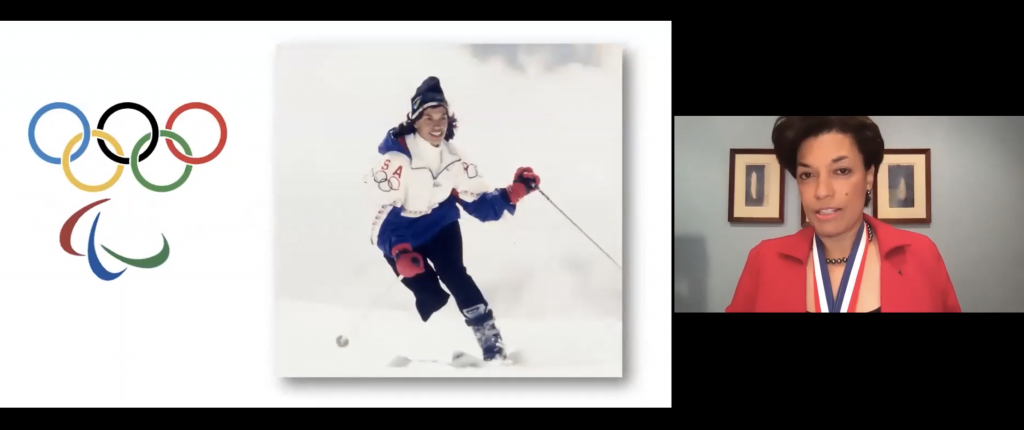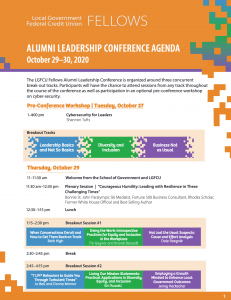CONNECTIONS AND COMMUNITY
While many treasured traditions vanished in the face of the COVID-19 pandemic, the LGFCU Fellows program remained committed to supporting its hundreds of alumni—and hosting its first-ever virtual alumni conference.
In a year filled with cancellations, postponements, isolation, and doubt, Willow Jacobson was always certain of one thing: the LGFCU Fellows alumni conference was going to happen.
“The conference was set long before COVID-19 hit,” said Jacobson, director of the Fellows program and Robert W. Bradshaw Jr. Distinguished Professor of Public Administration and Government at the UNC School of Government. “We un-booked the event space but we never changed those dates. We always knew we would need to support our alumni; we just knew we would need to modify the ‘how.’”
In order to understand the Fellows program’s commitment to its each of its alumni, it is helpful to take a step backward. From the time of its inception, the program was structured to provide (a) an immersive and powerful in-class cohort experience, and (b) committed and ongoing alumni support. By framing those components as the backbone of the program, the School of Government and LGFCU made a long-term investment in North Carolina’s emerging local government leaders.
“There was intentionality in the design of this approach,” Jacobson said. “We want our Fellows to know that we were committed to them during the class and will continue that commitment throughout their careers. LGFCU has been supportive of our alumni program from the very beginning.”
Alumni events provide a setting for Fellows to revisit, refresh, reinforce, and expand their skills and connections. With a foundational commitment from LGFCU to continue to serve and support Fellows alumni, Jacobson and her team built a virtual alumni conference from the ground up.

“In many ways, our program design was consistent,” Jacobson said. “The education offered would reinforce learning they had previously, deepen it, and complement it with new skills. They would be able to network and connect with fellow alumni. And finally, the experience would be high-quality and worthwhile.”
The conference’s virtual format did, however, provide the program with the opportunity to be flexible and explore new possibilities in format and attendee experience.

One exciting addition was a special “bring a friend” feature. Fellows alumni attending the conference were each given the option to extend an invitation for a colleague or peer to attend the conference with them. This feature expanded the conference’s impact and exposed the program to an entire new network of emerging leaders. Thanks to LGFCU’s support of the program, the conference remained free for all attendees.
“Our alumni would often tell us that they wished a person they work with could also have attended a session or heard a message with them,” Jacobson said. “Thanks to the flexibility of the virtual conference, we could respond to that request.”
A key feature of Fellows alumni conferences is also their relevance to current or reoccurring issues in public service leadership. With so many contemporary issues—including, but certainly not limited to, COVID-19—being faced by Fellows alumni, this year’s program offered, for the first time, three unique conference tracks by attendees.
“Willow said from the beginning that no single speaker could represent everything these alumni were dealing with in their work and lives,” said Program Manager Jessica Khan.
Those three tracks were specifically requested by alumni and featured 15 nationally-recognized speakers over two days:
- Leadership Basics and Not-So Basics
- Diversity and Inclusion
- Business Not-As-Usual
“We believe our leaders are the best and deserve the best,” Jacobson said. “I’m delighted that we could bring this high level of resources to these alumni.”
In total, the conference attracted 179 participants representing 35 counties, 49 municipalities, and eight other organizations, including federal agencies and nonprofits. Khan and Jacobson worked with School of Government staff to create a resource page that housed recordings, handouts, tools, and presentations to benefit conference attendees—a new feature that will be available for all conferences in the future.
| Top Conference Participation by Cohort | |
|---|---|
| 2019 Cohort 1 | 85% |
| 2019 Cohort 2 | 58% |
| 2018 Cohort | 54% |
| 2015 Cohort 1 | 46% |
| 2012 Cohort | 38% |
The LGFCU Fellows program has always drawn strength from the connectivity and community it provides to its participants. During a year of profound stress and isolation, the alumni conference built a space for its attendees to reconnect, support each other, laugh, have fun, and learn.
When Jacobson and the School of Government launched the Fellows program, they recognized the importance of helping leaders find relationships, connections, and resources across the state. There were tiers of support that would need to be provided. How could the program support individuals, cohorts, and eventually, an entire alumni network?
“From our first cohort, we have been focused on building and supporting a network of alumni, and as that grows we are seeing a critical mass across the state,” Jacobson said. “There are now hundreds of LGFCU Fellows alumni who live and work in 77 North Carolina counties. The way we serve our alumni will continue to evolve and require a great deal of support as that network continues to expand. Our appreciation, respect, and commitment to each individual alumni will remain consistent. ”
As Jacobson reiterates, the program must be committed to alumni during their cohort experience and throughout the duration of their careers. Through the continued Fellows experience, those alumni are given the tools they need to carry those lessons with them.
“I’m proud of the ripple effect our Fellows create,” Jacobson said. “Our program impacts individuals, and those individuals impact their organizations and communities.”
IN THEIR WORDS
“This was a wonderful virtual event. Love the support the UNC School of Government provides to all the Fellows and future Fellows. Thank you so much for continuing to keep us motivated to be the best government employees we can be during the changing and difficult times we are in, providing us with tools to keep our teams engaged and support their leadership growth, and reminding us we all have a great Fellows network with so much peer knowledge and peer-to-peer support.”
“In my day-to-day work, I am never recognized for public service and the personal sacrifices are invisible. Thank you for your commitment to this program and for investing in our professional growth so I can better serve our residents.”
“You put together a remarkable virtual conference. My cohort—those of us present—reconnected with individuals we haven’t seen or spoken with in a long time. We are now considering putting together our own Zoom meeting. We have also kept our peer counseling group together, doing monthly meetings. Through this virtual conference, we just added at least one more person to those monthly peer counseling sessions. Thank you ALL.”

